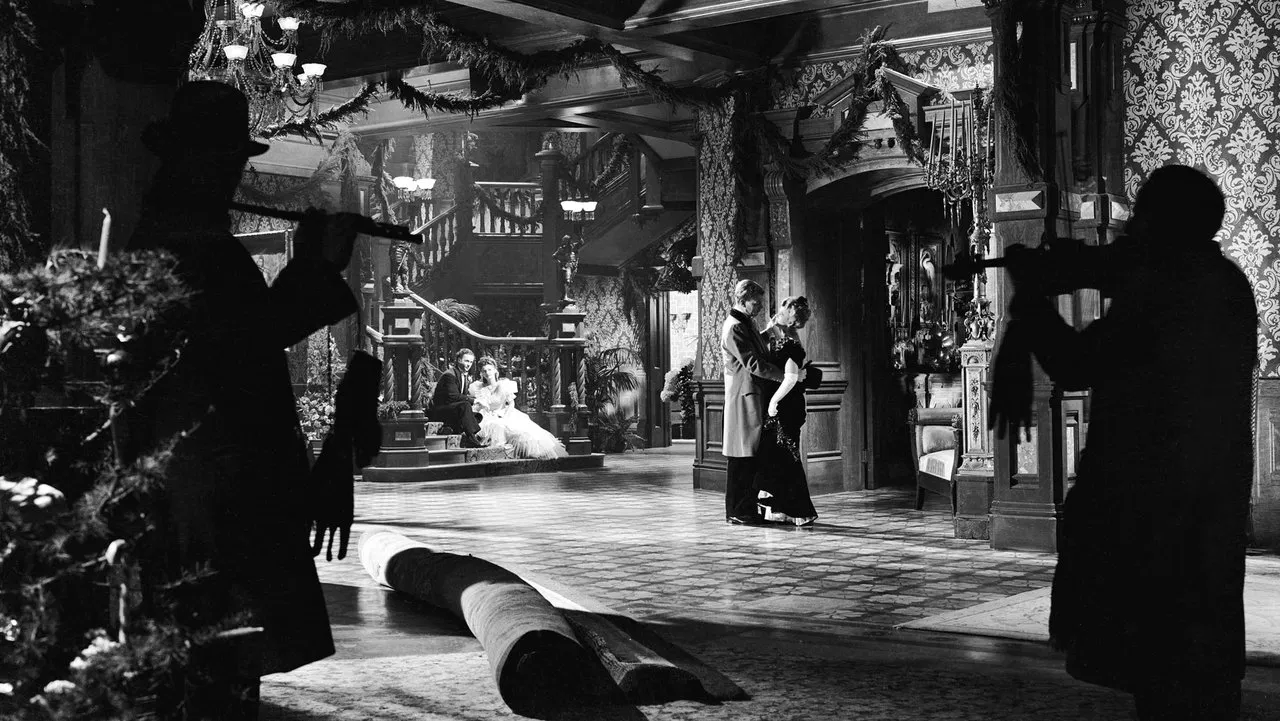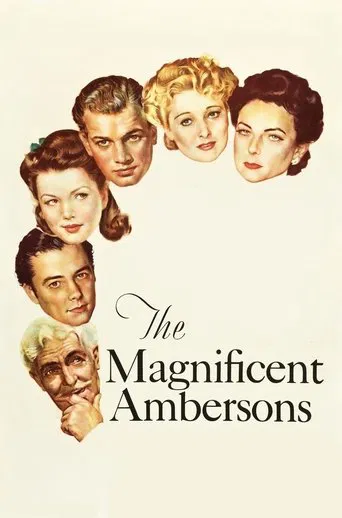

Although it has its amusing moments, in eneral the plot does not convince.
... View MoreWatch something else. There are very few redeeming qualities to this film.
... View MoreWhile it is a pity that the story wasn't told with more visual finesse, this is trivial compared to our real-world problems. It takes a good movie to put that into perspective.
... View MoreAn old-fashioned movie made with new-fashioned finesse.
... View MoreOrson Welles thought his version of The Magnificent Ambersons could had eclipsed Citizen Kane. What we have is a condensed film edited by RKO pictures who got rid off the negatives.The film has an interesting opening by Joseph Cotten which is also the engine of this film, change through the years and how it affects one small town. Cotten's Eugene Morgan becomes wealthy over time because of the automobile.The wealthy Ambersons become poorer due to bad investments, spoilt George Minafer (Tim Holt) behaves badly to those around him thinking his family inheritance will always be there.However despite gaining wealth Eugene Morgan never manages to spark his relationship with George's mother the widowed Isabel Amberson mainly due to George sabotaging the relationship.Welles as director is still experimenting with the art of film, the way scenes are shots, even the closing credits are narrated. The film is rather pacy due to the interference by the film studio.
... View MoreOrson Welles' Version of the Film Seems Forever Lost and it Runs a Full 50 Minutes Longer and is Assembled Differently. The Contrast Between what Welles Made and what Remains is More than Significant it is Profound. But All We Have is the RKO Version and While that has Received an Enormous Amount of Praise, it Must Be Said that the Praise is Singular and Cannot Reflect the Director's Original Intent.Basically it's the Second Half, Not Counting the Interruptions of the Long Fluid Shots and Such, where the Studio did the Most Damage. It has been Reported that Once Welles was Persuaded to Sit Down and Watch It, Decades Later, After About an Hour Stood Up and Said "From here on it's their Film". That Seems to be the Case, Because the Second Half is Not Near as Mesmerizing as the First. All Rushed and Jumbled Up. Choppy and Erratic, and the Ending is Ill Fitting. The Little 88 Minute Butchered, Mutilated, and Mangled Version is a Powerful but Painful Film to Watch. Even if One was to Know Nothing of the Changes it would be Obvious that Something was Not Only Missing but Amiss.Yes, it was Nominated for Four Oscars Including Best Picture and Most Film Critics Agree it is a "Magnificent" Work and Although what is Up There On the Screen is Technically Innovative and Beautiful at Times and is More Artistic than the Majority of Hollywood Product, the Tampering and Fiddling is Evident and Overall, Not at All Welcome. Still the Movie can be Enjoyed as Sort of a "Better Than Nothing" Glimpse at the Movie Making Expertise of Welles and Company (in shorthand).
... View MoreThis Orson Welles film was supposedly hacked to death with cuts but still has the Welles stamp on this still watchable but somewhat dated story. I like the deep focus and close-up shots that are also a part of Welles' classic Citizen Kane. The idea that inherited wealth breeds apathy and smugness is not new and George Amberson Minafer is a perfect example of a young man gone bad far too soon. In the role of George is Tim Holt who has wealth, good looks and status but is essentially a lad who resists change and lacks ambition. While this character does ring true, I found the one dimensional performance hollow and unconvincing. George does get his "comeuppance" but it seems like a morality lesson. Joseph Cotten is a reliable and strong presence on the screen and in his role as the suitor to George's mother, he plays a gentlemanly yet strong character, a more than worthy opponent to the spoiled boy who wants his mother to submit to his will. Cotten is a self-made man who champions the automobile, an invention that George cannot abide. Cotten's daughter is a youthful Anne Baxter, who has no difficulty spurning George's overtures of affection. Her role is limited but well performed. The best performance is delivered by Agnes Moorehead as George's sister, who displays much greater range than the other actors. All in all, not a bad movie but not a particularly interesting movie. Perhaps an audience in the the early 1940's would react more positively to the lesson.
... View MoreFot the longest time I've been conflicted in my attitude toward "Citizen Kane", regarded by many as Orson Welles' and America's finest film. It just didn't grab me that way. Earlier today, "The Magnificent Ambersons" managed to affect me in a way that "Citizen Kane" hasn't done after three viewings; I thought this was a masterful story told brilliantly, and that's without knowing ahead of time how the studio (RKO) butchered the original product.A particular scene that got me, cinematically speaking, was when George (Tim Holt) and Lucy (Anne Baxter) rode past Eugene Morgan (Joseph Cotten) in their horse drawn sleigh while other Amberson family members struggle to push Morgan's car through the snow. The beauty of that snow-scape seemed absolutely surreal and wonderful. Regarding Welles' use of lighting and camera angles, the scenes of George and Aunt Fanny (Agnes Moorehead) arguing up and down the staircase of their mansion was also incredibly effective. Perhaps I'm just noticing these things better now, but they seem to surpass the camera work of Welles' earlier triumph.Storywise, there's no arguing that Welles packs a lot of emotion into his decades spanning history of the Ambersons. Early on it felt as if the story was rushed to get to George's adulthood, but once there we learn that he never outgrew the tantrums of his youth. For Tim Holt to convey such an arrogant character was significant for me, as most of my viewing of Holt's work has been in rather perfunctory B Westerns. So his range as an actor, even if one sided here, was a worthy discovery for me.As regards my own age, I was rather drawn to the impact of Eugene Morgan's letter to Isabel (Dolores Costello) regarding her son George. I've had it personally confirmed repeatedly that '40 can't tell 20', and to see that concept on display in the latter half of the movie was quite impactful. It's probably the main reason that history is doomed to repeat itself with successive generations, even though we have the experience and teaching of many wise men who have gone before.
... View More